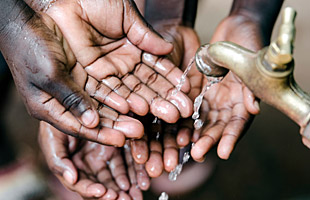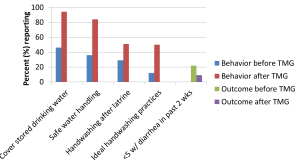Insight
Access to clean water and adequate sanitation are fundamental requirements for a healthy life. And yet, 664 million people have no source of clean water, and a quarter of the world’s population lacks basic sanitation. Improving access to clean water and sanitation is one of the most cost-effective ways to improve not just health but food security, economic growth, national and regional political security, and environmental sustainability for millions of people.1
Action

The Manoff Group believes that improving people’s access to clean water and adequate sanitation is essential, but not sufficient by itself to ensure people’s appropriate use of those services.
TMG was an early promoter of focusing on the proper use of WASH technologies, and evidence from our formative research helped establish the need to couple the improvement of WASH facilities with the provision of education and behavior change services.
Change
In Peru, TMG worked in five rural communities to reduce diarrheal disease by promoting the essential hygiene practices of consumption of safe drinking water, hand-washing at key moments, and latrine use and elimination of human feces.
Applying our TIPs approach [LINK TO TIPs page], TMG collaborated with local community members to understand their current hygiene practices and beliefs, identify adoptable improvements to those practices, implement those improvements, and monitor and adjust them as needed.
After one year of behavior change counseling with families, we found impressive, statistically significant improvement in several key behavioral practices.

Big changes in hygienic behaviors yielded an impressive decrease in cases of childhood diarrhea.